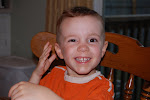Cullen has a pretty wide social network. He has mom and dad, known also as chief researcher and play therapist respectively. He has a speech therapist, a team of ABA therapists, multiple doctors, teachers and friends at preschool, a team of "attendants", grandparents, aunts and uncles, and cousins. He has a budding online network too.
Nevertheless, one of the hallmarks of autism is a deficiency in understanding and imitating social cues. In extreme cases, this might mean an autistic child is drawn completely into his or her own world, not interacting at all with the outside world—this is the image I once had of autism. But it might also mean that a child keeps quite active yet has a hard time “getting” the social stuff, which can create “non-typical” behaviors.
Last year, around the time Cullen was first diagnosed as being on the autism spectrum, he was more extreme than now. His would not make good eye contact, did not choose to engage with you (he’d duck and run), preferred repetitive behavior, and preferred repetitive behavior.
Cullen has greatly improved in the past year. His eye contact is better, he will stay focused on a task (well, some tasks), and he’s even affectionate.
But as it turns out, life is pretty social…relational. So the social problem shows up in all sorts of ways, many of them subtle. Turns out pointing is a social thing—that’s one thing Cullen cannot seem to comprehend. Language is of course social—if you say “Hi Cullen” he is likely to respond “Hi Cullen.” When he does say “hi” it is still often while he’s on the run or turning away. But he’s getting there.
It wasn’t always this way for Cullen—we so remember how he, as a little 7 month old, “held court” at his great-grandparents' house. He was squealing and laughing and enjoying being the center of attention. But something went wrong before age 2, and he withdrew. And after lots of intervention, he’s been making a comeback.
We’re busy, and we’re thankful.
The Fictions of Our Healing
7 years ago


No comments:
Post a Comment